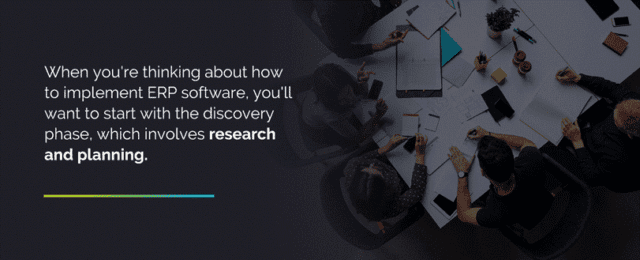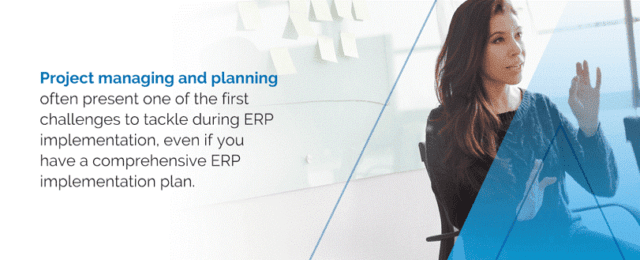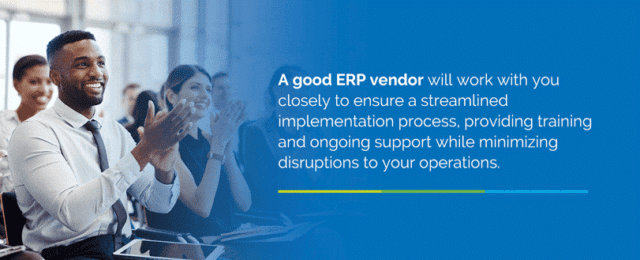ERP Implementation Process
Implementing an Enterprise Resource Planning (ERP) system like Optimus ERP can be transformative, but requires meticulous planning, customization, and support for success. Below, we outline the essential phases in a robust ERP implementation.

Discovery and Approval
The initial step in ERP implementation is a discovery phase, critical for aligning your ERP choice with business goals and processes. Begin by assembling an ERP discovery team, pulling representatives from departments like finance, IT, and operations, to accurately capture needs and workflows. This team identifies essential ERP features and develops a cohesive list of requirements that the system should meet.
In this phase, the team will:
-
- Review potential ERP vendors, including Optimus ERP, to understand functionalities and alignment with the company’s objectives.
- Seek proposals, request demos, and engage in hands-on trials of essential ERP capabilities.
- Develop a preliminary timeline and resource allocation plan.
After selecting the ideal ERP—Optimus ERP for its cost-effectiveness and modular flexibility—approval from key stakeholders, like the CFO, is typically necessary. This ensures that leaders understand implementation costs, timeline, risks, and anticipated benefits.
Planning
The planning phase solidifies the strategy for managing the ERP implementation. This stage involves finalizing the contract with the chosen ERP provider (e.g., Optimus ERP) and planning necessary infrastructure upgrades, such as enhanced storage or internet speed.
Workflow adjustments may also be planned here, taking advantage of Optimus ERP’s flexibility to align with current operations. Early feedback from employees who will use the ERP system helps refine the workflow design, anticipating user needs and minimizing disruptions.
Configuration and Testing
Tailoring the ERP system to specific business processes is vital. In this stage, your team will configure Optimus ERP, mapping existing workflows to its modules and ensuring integration with existing software systems. This setup involves data migration, which can be challenging but is made smoother with Optimus ERP’s comprehensive data integration tools.
Testing each module and function before full-scale deployment is essential for identifying configuration issues early. Begin with basic functions, progressively testing more advanced capabilities until the system is operating at optimal performance.
Training
Optimus ERP’s powerful modules require proper training for seamless adoption. Optimus provides comprehensive training resources and can support custom training sessions based on specific business needs. Training sessions empower employees to understand and utilize the ERP fully, helping to minimize resistance and maximize efficiency.
Deployment
After training, you can roll out Optimus ERP across the organization. Deployment can be done in stages or all at once, depending on your team’s comfort level and requirements. Even the most successful ERP implementations may encounter minor issues during this phase, but Optimus ERP’s dedicated support team is available to help quickly resolve any challenges.
Support and Stabilization
Post-deployment, ongoing support is crucial as the system stabilizes. Minor adjustments and reconfigurations may be necessary to adapt to user feedback and optimize ERP usage. Optimus ERP offers extensive support, ensuring that your team receives prompt assistance to troubleshoot and fine-tune the system as it becomes fully integrated into daily operations.
ERP Implementation Challenges and Solutions
ERP implementation can encounter various obstacles, but proactive planning with Optimus ERP can help mitigate these challenges.
Project Management and Planning
The initial project planning and securing executive buy-in can be challenging. Optimus ERP supports project planning with a dedicated implementation team, guiding companies in setting realistic timelines and ensuring stakeholders understand the ROI. Choosing an executive sponsor, such as a CFO, can also help secure necessary funding and advocate for the project.

Data Migration and Integration
Data migration is critical for a smooth ERP transition. Optimus ERP offers robust data integration tools to ease the transition from legacy systems, allowing your team to filter out irrelevant data while ensuring that essential information is clean, consistent, and compatible with the new ERP structure.
Change Management
Employees often resist new systems, but change management strategies can foster enthusiasm. With Optimus ERP, extensive training and support reduce the learning curve. Additionally, executive endorsement and visible commitment from senior management encourage team-wide acceptance.
Hidden and Overrun Costs
Budget overruns are common due to unforeseen costs, such as additional training or infrastructure upgrades. Optimus ERP offers a comprehensive project planning approach that identifies potential expenses upfront, including both direct implementation and ongoing costs, reducing the likelihood of budget overruns.

Best Practices for ERP Implementation
For a smooth and effective ERP implementation, consider these best practices with Optimus ERP:
-
Get Leadership Buy-In:
Leadership commitment is essential for a successful rollout. With a C-level sponsor backing Optimus ERP, securing funding and support becomes easier, promoting a culture of acceptance.
-
Choose the Right Vendor:
Selecting the right ERP vendor is critical. Optimus ERP stands out for its client-focused approach, offering training, support, and tailored features that align closely with diverse business requirements.
-
Plan Thoroughly:
Careful planning can save time and money later. Optimus ERP’s dedicated team assists clients in setting up a detailed roadmap that includes budget considerations, timeline, and required features to avoid surprises.
-
Manage Expectations:
Clear communication about potential challenges helps avoid disappointment. Optimus ERP’s team can help set realistic expectations for your organization, providing guidance on potential challenges, and outlining a path to address them.
-
Provide Ample Support and Training:
Quality training is essential for a successful ERP transition. Optimus ERP’s training materials and live support options prepare your team to navigate new processes confidently.
-
Prioritize Testing:
Thorough testing can catch bugs early and prevent larger issues. Optimus ERP encourages an extended testing period, allowing clients to refine their system before full deployment.
Optimus ERP Implementation Support
Optimus ERP provides comprehensive support throughout the ERP implementation process, delivering a range of advantages to ensure successful deployment and seamless operations.
-
In-House Expertise:
Optimus ERP has an all-in-house support team, offering consistent, high-quality service without relying on third-party providers.
-
Industry Knowledge:
With a team of experienced accountants and industry experts, Optimus ERP brings a deep understanding of business operations, particularly in finance, which guides ERP customization to align closely with industry requirements.
-
Consultative Support:
Optimus ERP’s approach is highly consultative, focusing on deep discussions to adapt the ERP to each client’s needs, from finance-centric configurations to specialized modules for scalability.
-
Ongoing Support:
Optimus ERP’s support does not end at deployment. Post-implementation assistance ensures your team has access to experts for troubleshooting and guidance as they settle into the new ERP system.
-
Unlimited Assistance:
Unlike competitors that cap support hours, Optimus ERP offers unlimited assistance, ensuring clients get the help they need to unlock the full potential of the system.
Conclusion: Seamless ERP Implementation with Optimus ERP
Optimus ERP offers a comprehensive suite of ERP tools, designed to streamline complex workflows, break down data silos, and improve efficiency across your organization. With over a decade of experience, Optimus ERP brings unmatched industry insight and a commitment to continuous service improvement, making it an excellent choice for companies seeking a powerful yet budget-friendly ERP solution.
Whether you are looking to enhance financial management, optimize resource allocation, or improve operational workflows, Optimus ERP’s wide range of scalable modules can support your business as it grows.
About us
We are Timus Consulting Services, a fast-growing, premium Governance, Risk, and compliance (GRC) consulting firm, with a specialization in the GRC implementation, customization, and support.
Our team has consolidated experience of more than 15 years working with financial majors across the globe. Our team is comprised of experienced GRC and technology professionals that have an average of 10 years of experience. Our services include:
- GRC implementation, enhancement, customization, Development / Delivery
- GRC Training
- GRC maintenance, and Support
- GRC staff augmentation
Our team
Our team (consultants in their previous roles) have worked on some of the major OpenPages projects for fortune 500 clients across the globe. Over the past year, we have experienced rapid growth and as of now we have a team of 15+ experienced and fully certified OpenPages consultants, OpenPages QA and OpenPages lead/architects at all experience levels.
Our key strengths:
Our expertise lies in covering the length and breadth of the IBM OpenPages GRC platform. We specialize in:
- Expert business consulting in GRC domain including use cases like Operational Risk Management, Internal Audit Management, Third party risk management, IT Governance amongst others
- OpenPages GRC platform customization and third-party integration
- Building custom business solutions on OpenPages GRC platform
Connect with us:
Feel free to reach out to us for any of your GRC requirements.
Email: [email protected]
Phone: +91 9665833224
WhatsApp: +44 7424222412
Website: www.Timusconsulting.com





